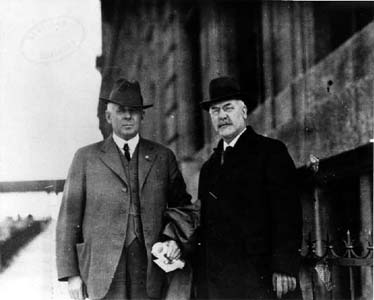Search | Image Archive | Reference | Communities | POV | Lesson Plans | Credits
 When the Liberal Government of T. C. Norris replaced Rodmond Roblin's Conservatives in 1915, the population of Manitoba was calling for dramatic social change. Roblin's government had left a legacy of public works, but had also left a depleted treasury and a memory of corruption. It was corruption that had brought the Roblin government down in the Legislature Scandal of 1915.
When the Liberal Government of T. C. Norris replaced Rodmond Roblin's Conservatives in 1915, the population of Manitoba was calling for dramatic social change. Roblin's government had left a legacy of public works, but had also left a depleted treasury and a memory of corruption. It was corruption that had brought the Roblin government down in the Legislature Scandal of 1915.
Norris was elected with the support of many social reformers. One of the key issues in the election of 1915 was suffrage, and the Liberals had pledged that they would enact full female suffrage upon taking office. This garnered them the support of many prominent suffragists like Nellie McClung, who had returned to Manitoba from her home in Alberta to campaign on behalf of Liberal candidates.
Soon after it was elected, the Norris government acted on some of its promises of social reform. In 1916, Manitoba became the first province to offer the vote to all women. In the same year the province's first minimum wage legislation was passed, and a Public Schools Act lengthened the school year and made school attendance compulsory for all Manitoba children.
The Norris government garnered many votes on the promise to hold a referendum on the question of prohibition. Prohibition was a lingering issue with many Manitobans, and Premier Roblin's refusal to enforce existing liquor laws or to respect an earlier referendum had angered many. In 1916, another referendum was held, and legislation was subsequently passed making the sale of liquor (but not the import for personal use) illegal.
Subsequent years saw a number of other progressive changes, including the strengthening of the University of Manitoba (which was merged with the Manitoba Agricultural College), the extension of public welfare services, the introduction of workers' compensation and the training of nurses. There were also changes made to the civil service. Manitobans were disenchanted with the patronage and corruption of the Roblin government, and in response Norris created the Civil Service Commision in 1917. This body set standard exams for candidates for civil service jobs and ensured that the lower levels of the bureaucracy were free from government interference.
The early years of the Norris era were not without blemish. With the War in Europe, animosity was building towards the large German and Slavic populations in Manitoba. Norris responded to widespread nativism and enacted a number of "enemy alien" laws, including laws which banned the use of languages other than English in schools.
In 1917, the Conservatives and the Liberals joined in coalition to support the War effort, and Norris presided over a government united in its support of the contentious issue of conscription. He remained as premier after the end of the War, presiding over the dislocation and economic slump that contributed to the Winnipeg General Strike in 1919. Norris was defeated by the United Farmers of Manitoba led by John Bracken in 1922, but remained as a Liberal MLA until his retirement in 1928.
Page revised: 23 August 2009